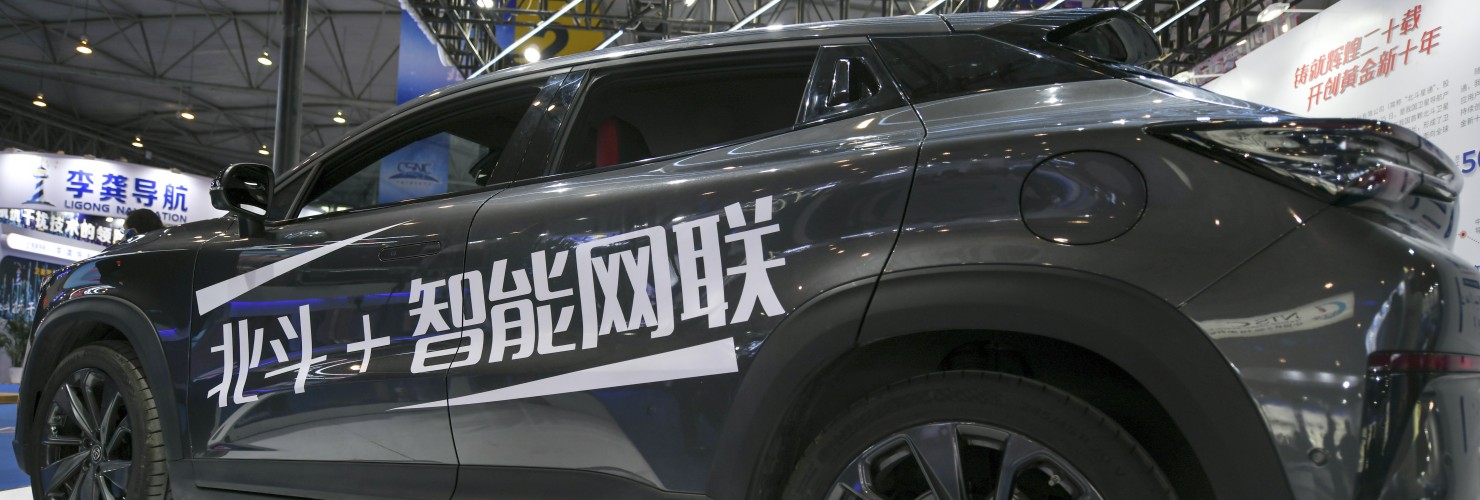

Smart car standards + Auto recycling + Blockchain
1. MIIT to speed up smart car standard development and internationalization
At a glance: The Ministry of Industry and Information Technology (MIIT) has issued draft guidelines for the establishment of a cybersecurity standard system for connected vehicles. The guideline’s annex specifies 97 standards split into five categories (basic, terminal safety, network communication safety, data security and application service security) which companies, standardization organizations and research institutes ought to prioritize. Among the targets mentioned are:
- By 2023, build an initial intelligent connected vehicle (ICV) network security standard system incorporating 50 key and urgently needed safety standards
- By 2025, establish a relatively complete ICV network security standard system with at least 100 key standards covering areas such as vehicle operating system safety and 5G V2X-based wireless communication security
- Promote the integration of international standards at the domestic level and the acceptance of domestic standards internationally
MERICS comment: As the commercialization of data-hungry autonomous vehicles picks up speed – Baidu recently partnered with BAIC to build 1,000 driverless robotaxis over the next three years – there is an urgent need to standardize and regulate cybersecurity within the industry. Such measures will help to ensure the physical safety of passengers and pedestrians as well as protect data from cyberattacks.
The draft highlights how Beijing views the ICV sector as an opportunity to advance industrial upgrading. Setting standards and facilitating their internationalization can help the industry’s further development and firms in China to gain a first-mover advantage. Standardization can also fast-track R&D and indigenous innovation efforts by eliminating redundancy, which is why standardization has featured heavily in China’s industrial policies like Made in China 2025 and China Standards 2035.
With China’s ambitious standard-setting agenda in mind, foreign companies need to be involved in Chinese standard-making to avoid falling behind technologically and end up as standard-takers. However, they often lack access or voting rights to key institutions in China’s standard-setting system. As China pushes to internationalize its standards, it becomes more urgent that foreign companies in China advocate their rights to access standard-setting activities and financing provided by the government.
Policy name: Guidelines on the Construction of a Cybersecurity Standard System for Connected Vehicles (Intelligent Networked Vehicles) (Draft for Comments) (车联网(智能网联汽车)网络安全标准体系建设指南(征求意见稿)) (Link)
Issuing body: MIIT
Date: June 21, 2021
2. Pilot scheme aims to counter impending car waste crisis
At a glance: Four ministries released an implementation plan for an extended producer responsibility trial for the car industry. Set to run for two years, the pilot will demonstrate how to efficiently manage resources throughout the whole product life cycle. Under the terms of the plan, by 2023 participating firms are expected to:
- Recycle 75 percent of the materials and parts of scrapped cars
- Use no less than 5 percent recycled materials in the construction of core components for new vehicles
- Design new cars to be at least 95 percent recyclable
Foreign owned companies operating in China are eligible to participate in the pilot, with applications open until August 31.
MERICS comment: Extended producer responsibility (EPR) laws require manufacturers to ensure the reuse, recycling or recovery of their products at the end of their lifetime. China introduced an EPR for e-waste in 2012, but its extension to the automobile industry is overdue. As of 2020, only a third of China’s end-of-life vehicles are being recycled. Yearly scrap car volume is set to balloon in the coming years due to increased car ownership. As Beijing seeks to set the country on a green development pathway, expanding the EPR system is a must.
The pilot scheme will likely be quickly converted to a mandatory policy. According to a State Council notice from January 2017, the EPR system laws and regulations for the car industry are to be complete by 2025. Should they participate in the pilot scheme, foreign firms could gain a head start on their competitors in China and influence the shaping of the final policy.
Further regulation of the industry will impose higher compliance costs on firms, yet European manufacturers stand to benefit from their experience in designing and producing cars so they can be efficiently dismantled, reused and recovered. The targets set in the implementation plan are similar to the current EU requirements for end-of-life vehicles, whereby at least 85 percent of the weight of scrap vehicles must be reusable or recyclable and 95 percent reusable or recoverable.
Policy name: Notice on the Automotive Product Extended Producer Responsibility Pilot Implementation Plan (四部委关于印发汽车产品生产者责任延伸试点实施方案的通知) (Link)
Issuing bodies: MIIT, MOST, MOF, MOFCOM
Date: June 9, 2021
3. Amid cryptocurrency crackdown, China signals support for other blockchain applications
At a glance: MIIT and the Cyberspace Administration of China (CAC) published guidelines to boost the country’s development and application of blockchain technology through 2030. China intends to rank as a global blockchain technology leader by 2025. Other targets include:
- Create new products and services using blockchain’s advantages in product traceability, data circulation, logistics and supply chain management
- Cultivate three to five internationally competitive blockchain enterprises by 2025
- Establish a blockchain standardization organization, develop a blockchain standard system and participate in global standard setting
- Enhance the integration of blockchain with the Industrial Internet, big data, cloud computing and AI
MERICS comment: Few other governments support blockchain like China, which has included the technology in its new infrastructure initiative and as an emerging digital industry in the 14th Five-Year Plan (FYP). While China has cracked down on cryptocurrencies, which use blockchain, the guidelines signal that China remains supportive of other blockchain applications – as long as they are “controllable.” Indeed, to regulate the sector, China requires blockchain projects to be filed with the CAC.
According to the policy, China wants to build a holistic blockchain system that combines the development of new products and services, the application of the technology to upgrade traditional sectors like manufacturing and the creation of a blockchain standard system. As a next step, provinces are likely to establish pilot schemes, and support companies using blockchain through preferential taxation and government procurement.
Frontrunner Zhejiang province has already published a five-year plan dedicated to blockchain to become a domestic and globally leading blockchain innovation hub. Apart from setting targets to build blockchain R&D centers and develop blockchain patents, Zhejiang is pushing for blockchain applications in the manufacturing, services and agricultural sectors as well as society and governance. To leverage blockchain in manufacturing, the province plans to set up an Industrial Internet platform based on blockchain. Local companies like Alibaba and Geely are eager to promote the use of the technology. For example, Geely is partnering with the Swiss-based non-profit organization, Concordium Foundation, to offer blockchain services to businesses within China.
Policy name: Guidelines on Accelerating Blockchain Technology Applications and Industry Development (两部门关于加快推动区块链技术应用和产业发展的指导意见) (Link)
Issuing bodies: MIIT, CAC
Date: June 7, 2021
4. President Xi urges academia to accelerate China’s technological development
At a glance: President Xi Jinping delivered a speech at a joint meeting of China’s leading scientists and underlined the role of science and technology (S&T) in the nation’s development. Xi noted that weaknesses remain in China’s innovation capabilities and that bottlenecks in core technologies need to be overcome. To address this, President Xi called on officials and the scientific community to:
- Speed up the formulation of a ten-year action plan for basic research to strengthen original S&T research
- Set new evaluation standards for researchers and projects, focused on innovation and quality rather than on output volume
- Give researchers more autonomy and freedom to determine their research focus and the use of funds; reduce bureaucracy and administrative tasks
MERICS comment: The speech shows that scientists and researchers in China are under pressure to advance the government’s goals in technological upgrading. Policymakers hope to fully leverage top academic institutions to achieve their industrial policies aims. In April, President Xi visited Tsinghua University, where he highlighted the importance of strengthening basic research and independent innovation. In May, Tsinghua was listed amongst the first batch of twelve universities to establish Future Technology Institutes. The institutes are tasked with cultivating future innovation leaders and conducting R&D in cutting-edge technologies which will emerge in the next 10-15 years. As outlined in the 14th Five-Year Plan, this includes quantum information, gene technology, hydrogen energy and energy storage.
As President Xi points out in his speech, enhancing China’s S&T performance requires two seemingly contradictory goals: pursuing targeted and “problem-oriented” S&T research, while also giving more freedom and decision-making power to researchers. Different funding streams can help to achieve both aims, as in the National Key R&D Program (see China Industries Briefing for May). The emphasis on reforming research evaluation standards is also crucial. Attempts to gain an advantage in emerging technologies are undermined by the skewed appraisal system for academics in China, which focuses heavily on the quantity of research published and the reputation of the journals they are published in.
Article name: Xi Jinping: Speech at the 20th Congress of the Chinese Academy of Sciences, the 15th Congress of the Chinese Academy of Engineering and the 10th National Congress of the Chinese Association for Science and Technology ((受权发布)习近平:在中国科学院第二十次院士大会、中国工程院第十五次院士大会、中国科协第十次全国代表大会上的讲话) (Link)
Issuing body: Xinhua
Date: May 28, 2021
5. NDRC releases tailored action plan for desalination technology
At a glance: The National Development and Reform Commission (NDRC) and the Ministry of Natural Resources issued a five-year action plan for the development of China’s desalination capabilities. The policy aims to unlock the seawater resources of China’s coastal areas and contribute to solving China’s water scarcity crisis. Key targets mentioned in the document include:
- Incorporate desalinated seawater into the general water supply and expand its use in industrial parks and on shipping vessels
- Establish R&D clusters, support the domestic desalination industry and spur on advances in core technology, such as osmosis membranes
- Formulate international standards for desalination technology and promote the use of Chinese desalination technology in BRI countries
MERICS comment: China’s interest in the potential of desalination technology can be traced back half a century to the national desalination campaign of 1967-69. Since then, the use of desalination plants has been repeatedly encouraged in China’s Five-Year Plans. In 2015, the State Council included maritime engineering equipment among ten core industries to strive for global tech-leadership in the seminal Made in China 2025 industrial strategy. The release of this desalination action plan for 2021-2025 comes as industrial upgrading, environmental protection and water scarcity issues have all become key priorities for the central government.
As it stands, China lags behind Europe in the field of desalination technology. While five European firms are among the world’s 15 largest desalination companies, only two of them are Chinese. Four out of those European companies have had a strong presence in Mainland China for decades. For them, the development plan signals an opportunity to expand as demand grows for desalination services and products in China. But China’s ambitions to support its domestic industry will also increase competition within China and in third markets.
Policy name: Notice on the "Desalination Development Action Plan (2021-2025)” (国家发展改革委自然资源部关于印发《海水淡化利用发展行动计划(2021—2025年)》的通知) (Link)
Issuing bodies: NDRC, MNR
Date: June 2, 2021
WORTH NOTING
Policy news
- May 26: Politburo Standing Committee member Han Zheng chairs the first meeting of the leading small group on peak carbon emissions and achieving carbon neutrality, emphasizes need to adjust the nation’s energy structure and promote green technologies (CCTV article (CN); Caixin article (EN))
- June 1: The Ministry of Ecology and Environment directs local governments to start piloting environmental impact assessments, including CO2 emissions as part of the evaluation of new construction projects (State Council notice (CN); Caixin article (EN))
- June 3: Shenzhen legislature issues a draft law protecting personal data and restricting its use by technology companies which is set to become the first local data law in China (Shenzhen government notice (CN); SCMP article (EN))
- June 3: NDRC warns provincial governments against missing energy efficiency targets for 2021 as two-thirds fail to meet goals for Q1 2021 (NDRC notice (CN); Reuters article (EN))
- June 7: MIIT issues annual Internet Taskforce Workplan for 2021 with 90 measures promoting digitalization, 5G implementation, standards setting and more (MIIT notice (CN); Xinhua article (EN))
- June 10: MIIT opens applications for four pilot scenarios to improve the cybersecurity of connected vehicles, focusing on vehicle-cloud, vehicle-vehicle, vehicle-road and vehicle-equipment communication (MIIT notice (CN); AutoTech article (EN))
- June 11: NDRC announces that new solar and onshore wind projects will no longer receive central government subsidies due to declining production costs (NDRC notice (CN); Reuters article (EN))
- June 23: MIIT releases draft notice calling on companies in the field of intelligent connected vehicles to strengthen cybersecurity measures and only collect data necessary for relevant operations (MIIT notice (CN))
- June 30: The China National Intellectual Property Administration and other authorities release action plan for 2021-23 on the use of intellectual property as collateral for financing, with the aim to support the development of industrial parks and boost funding for SMEs (State Council notice (CN))
Corporate news
- June 3: Huawei launches its new HarmonyOS smartphone operating system, designed to run on smartphones and connect other devices such as laptops, smartwatches, cars and appliances (Huawei press release (CN); Huawei press release (EN))
- June 9: Shanghai Tech Startup Tsingshen plans to deploy eight satellites by 2025 to form a communications network meeting the needs of over 500,000 users (The Paper article (CN); Yicai article (EN))
- June 12: Geely chairman, Li Shufu, says the company will keep testing methanol-fuelled taxis and trucks even though the effort may fail (Sohu article (CN); SCMP article (EN))
- June 22: Shenzhen Technology University to establish a School of Integrated Circuits in cooperation with Semiconductor Manufacturing International Co (SMIC) (Sznews.com article (CN); Global Times article (EN))
- June 23: The State-owned Assets Supervision and Administration Commission approves the merger of China Electronics Technology Group and China Putian Information Industry Group; the combined annual turnover of the two firms is expected to be USD 50 billion (SASAC notice (CN); Nikkei Asia article (EN))
- June 24: Hengli Petrochemical announces it will invest RMB 1.8 billion (USD 279 million) in a biodegradable plastic project in Dalian to meet growing market demand for more environmentally friendly products (Sina article (CN); Yicai article (EN))
- June 25: BASF and Shanghai Jahwa United Co., Ltd – the largest Chinese manufacturer of beauty and personal care goods – sign a technology innovation cooperation agreement (Joint press release (CN); Joint press release (EN))
- June 29: Miracle Automation Engineering, a logistics developer, announces plans to invest CNY 5 billion in battery recycling (Yicai article (EN))

